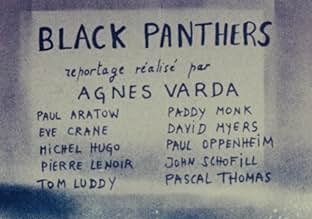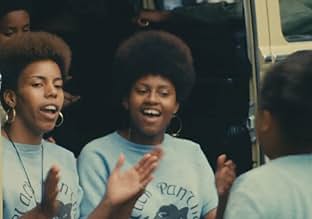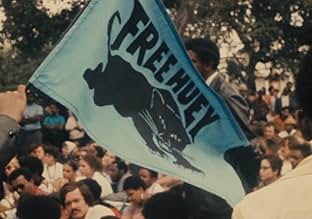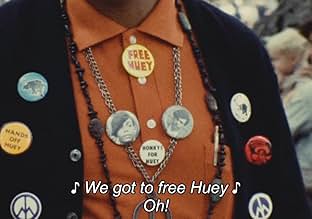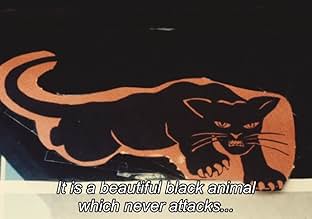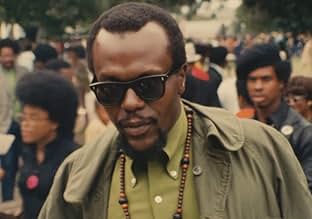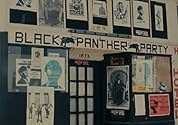IMDb-BEWERTUNG
7,4/10
2923
IHRE BEWERTUNG
Füge eine Handlung in deiner Sprache hinzuA short film of interviews and protests at a rally to free Huey P. Newton.A short film of interviews and protests at a rally to free Huey P. Newton.A short film of interviews and protests at a rally to free Huey P. Newton.
H. Rap Brown
- Self
- (Nicht genannt)
Ron Dellums
- Self
- (Nicht genannt)
James Forman
- Self
- (Nicht genannt)
Bobby Seale
- Self
- (Nicht genannt)
Empfohlene Bewertungen
Black Panthers (original title) is listed by IMDb with the title "Huey" (1968). However, we saw it with the original title. This half-hour documentary was directed by the French filmmaker Agnès Varda.
Varda went to a Black Panther rally in Oakland. The Panthers were demanding that the government free Huey Newton, co-founder of the Black Panther party. Newton was on trial, accused of murdering a police officer.
Beside filming the rally itself, Varda filmed an interview with Newton himself while he was in jail, In addition, she interviewed or recorded H. Rap Brown, Stokely Carmichael, Bobby Seale, and Eldridge Cleaver.
The Black Panthers Party was a revolutionary party, and they made no secret of the necessity to use violence to obtain their goals. They considered themselves at war with the Oakland Police Department. (Probably, the feeling was mutual.)
This is a historically important movie, especially for those who aren't old enough to remember the events of the late 1960's. It's also a lesson in the craft of documentary filmmaking, as exemplified by Agnès Varda. I would sum it up as "speak softly, but get the footage you need."
We saw this film at the wonderful Dryden Theatre in the George Eastman Museum in Rochester, NY. It's part of a Varda retrospective, co-sponsored by Rochester Institute of Technology and the Eastman Museum. I'm sure it will work well on the small screen.
P.S. Newton was eventually convicted of manslaughter, but a higher court overturned the verdict. He had two more trials, both of which ended in hung juries. Ultimately, the government gave up.
Varda went to a Black Panther rally in Oakland. The Panthers were demanding that the government free Huey Newton, co-founder of the Black Panther party. Newton was on trial, accused of murdering a police officer.
Beside filming the rally itself, Varda filmed an interview with Newton himself while he was in jail, In addition, she interviewed or recorded H. Rap Brown, Stokely Carmichael, Bobby Seale, and Eldridge Cleaver.
The Black Panthers Party was a revolutionary party, and they made no secret of the necessity to use violence to obtain their goals. They considered themselves at war with the Oakland Police Department. (Probably, the feeling was mutual.)
This is a historically important movie, especially for those who aren't old enough to remember the events of the late 1960's. It's also a lesson in the craft of documentary filmmaking, as exemplified by Agnès Varda. I would sum it up as "speak softly, but get the footage you need."
We saw this film at the wonderful Dryden Theatre in the George Eastman Museum in Rochester, NY. It's part of a Varda retrospective, co-sponsored by Rochester Institute of Technology and the Eastman Museum. I'm sure it will work well on the small screen.
P.S. Newton was eventually convicted of manslaughter, but a higher court overturned the verdict. He had two more trials, both of which ended in hung juries. Ultimately, the government gave up.
While her husband Jacques Demy was in L. A. filming MODEL SHOP (1969), Agnes Varda was in Oakland Directing this Documentary short centered on the protests trying to free Black Panther leader Huey Newton (who is interviewed in prison). The resulting film is an interesting 'you are there' look at the group.
Varda and her team got incredible access to document the group (and not just their protests). Members speak directly to the camera and without filter. There is no question that Varda's sympathies lie with the Panthers. An unidentified American woman narrates (surprising that her name has never been revealed). It's simple and straightforward, but, always tilted in favor of the group.
Originally, this was supposed to air on French TV, but, the government got cold feet over the incendiary image of the Panthers and didn't broadcast it. The short has been beautifully restored and looks and sounds fantastic. The 16mm footage retains it's verite feel, but, the restoration is so fine one swears it could be 35mm.
Streaming on Criterion and other outlets; Also available on DVD.
Varda and her team got incredible access to document the group (and not just their protests). Members speak directly to the camera and without filter. There is no question that Varda's sympathies lie with the Panthers. An unidentified American woman narrates (surprising that her name has never been revealed). It's simple and straightforward, but, always tilted in favor of the group.
Originally, this was supposed to air on French TV, but, the government got cold feet over the incendiary image of the Panthers and didn't broadcast it. The short has been beautifully restored and looks and sounds fantastic. The 16mm footage retains it's verite feel, but, the restoration is so fine one swears it could be 35mm.
Streaming on Criterion and other outlets; Also available on DVD.
Bless Agnès Varda for making this short documentary, and for the most part simply allowing members of the Black Panthers to state their views and explain the motivation behind the Black Power movement. The issues are the same as those faced today by the community, and it certainly resonates to hear them speak of stopping the police from killing black people, or of incarceration as being stilted against minorities. The film was made around the time of the Huey Newton trial, and after governor Ronald Reagan had hypocritically overturned California's open carry law once black people started taking advantage of it. Mostly it consists of footage of people at rallies to "Free Huey!," interviews with leaders like Newton and Stokely Carmichael, and comments from supporters. It also includes great commentary from Kathleen Cleaver explaining the significance of black women wearing their hair naturally, in afros.
The film is a snapshot in time during the summer of 1968 which made it fascinating to me, but I wish it had been longer and more fleshed out. It probably should have also asked a critical question or two about the movement looking to Mao Zedong as a role model, given the brutality of his regime and the millions he killed. On the other hand, millions of black people had (and have) died in the system they were in with its widespread racism, so one can understand searching for an alternative, and becoming as assertive as they did when progress didn't just gradually happen. I loved how Varda provided a few moments of gentle narration, explaining to audiences the reasons for what seemed like a dangerous and possibly violent movement. This is well worth a half hour, and something to reflect on over half a century later.
The film is a snapshot in time during the summer of 1968 which made it fascinating to me, but I wish it had been longer and more fleshed out. It probably should have also asked a critical question or two about the movement looking to Mao Zedong as a role model, given the brutality of his regime and the millions he killed. On the other hand, millions of black people had (and have) died in the system they were in with its widespread racism, so one can understand searching for an alternative, and becoming as assertive as they did when progress didn't just gradually happen. I loved how Varda provided a few moments of gentle narration, explaining to audiences the reasons for what seemed like a dangerous and possibly violent movement. This is well worth a half hour, and something to reflect on over half a century later.
While Agnes Varda was in California shooting "Uncle Yanco", she made this short documentary about a rally to free Huey Newton after he had been jailed, as the documentary tells us, a shoot-out with the police that ended with ten people injured and one cop dead.
Mme. Varda shoots and edits this as an anthropological study, with only Back people speaking; indeed, you have to look carefully to spot a Caucasian in the background. Having grown up in this era, I note that it's a useful corrective to the usual coverage of events like this, in which one heard White people talking about the racial divide and how to deal with it.
Mme. Varda shoots and edits this as an anthropological study, with only Back people speaking; indeed, you have to look carefully to spot a Caucasian in the background. Having grown up in this era, I note that it's a useful corrective to the usual coverage of events like this, in which one heard White people talking about the racial divide and how to deal with it.
Since Agnès Varda died recently, I decided to watch two of her short documentaries filmed in the San Francisco Bay Area. One is "Uncle Yanco", about her relative in Sausalito. But the more important one is "Black Panthers". This half-hour doc focuses on a Black Panther rally in Oakland in August, 1968. The main purpose of the rally is to call for the release of Huey Newton, in jail on charges of killing a cop. But the rally touches on a number of other things: police brutality towards the black community, the Vietnam War, and calls for worldwide unity against imperialism. In fact, one interviewee lays out several demands that the black community is making in its call for justice (freedom, decent housing, well-paying jobs, good education, etc). There's also an interview with Newton in jail, where he details the horrible treatment that he experiences.
Contrary to what a lot of people like to say, the Black Power Movement was not about "hating white people". It was about teaching the black community to defend itself and recognize the beauty in, among other things, natural hair. The Black Lives Matter movement is the heir to this.
Definitely watch this doc.
Contrary to what a lot of people like to say, the Black Power Movement was not about "hating white people". It was about teaching the black community to defend itself and recognize the beauty in, among other things, natural hair. The Black Lives Matter movement is the heir to this.
Definitely watch this doc.
Wusstest du schon
- WissenswertesThis film is included in "Eclipse Series 43: Agnès Varda in California", released by Criterion.
- Zitate
Narrator: The panther was chosen as their symbol. It is a beautiful black animal which never attacks, but, defends itself ferociously.
- VerbindungenFeatured in Berkeley in the Sixties - Die Geburt der 68er Bewegung (1990)
Top-Auswahl
Melde dich zum Bewerten an und greife auf die Watchlist für personalisierte Empfehlungen zu.
Details
Zu dieser Seite beitragen
Bearbeitung vorschlagen oder fehlenden Inhalt hinzufügen

Oberste Lücke
By what name was Black Panthers - Black is Honest and Beautiful... (1968) officially released in India in English?
Antwort
